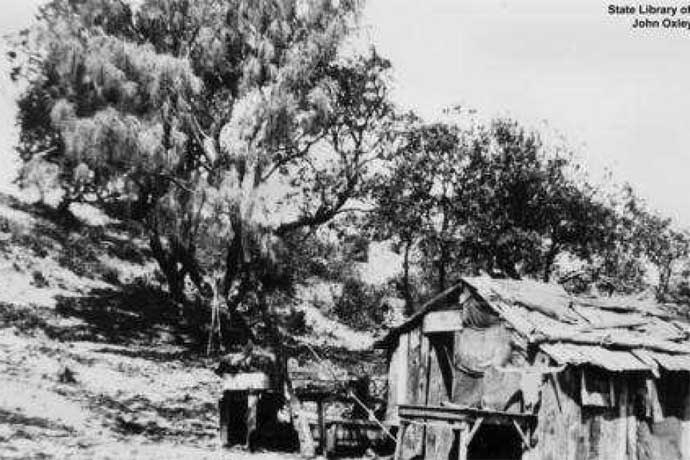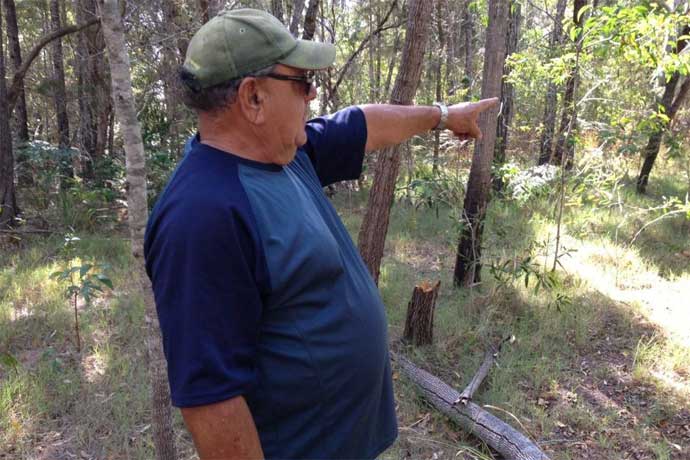Queensland scientists discover 70 Aboriginal graves on Fraser Island lost for more than 110 years
Bruce Atkinson ABC News 10 Nov 2014

Shelter at Boggimbah, Fraser Island. (John Oxley Library)
After more than a century the final resting place of about 70 Aborigines has been located on Fraser Island with the use of traditional methods and modern technology.
In July, a team of scientists from the University of the Sunshine Coast used ground penetrating radar to search the site of the old Bogimbah Mission on the western side of Fraser Island.
Local Aboriginal rangers trained in how to locate and record historical sites had earlier identified the possible location of the graves, never recorded and thought lost to history.
The results of the radar search have now been exclusively revealed to the ABC, bringing an end to more than 110 years of uncertainty.
"We were all pretty amazed that the first transect that we did we picked up a row of what appeared to be graves," University of the Sunshine Coast associate lecturer in soil science and geology Peter Davies said.
"Within a couple of hours we had found three separate cemeteries and probably around about 30 grave sites.
"Science is never that easy so we were pretty amazed that we did pick it up so quickly."
Park rangers used ground penetrating radar to search the site. (7pm TV News QLD)
Heritage consultant Phil Fitzpatrick, who helped train the Butchulla rangers, was on Fraser Island with the search team.
SU Related Article

"We started finding the graves one by one and then they started to form into a pattern because they were laid out in lines and they were roughly the same distance apart and it looked very much like a cemetery," Mr Fitzpatrick said.
"There was a slow realisation that we'd found something and then when the guys with the ground penetrating radar sat down with the thing and had a good look at it and they just sort of looked up and grinning all over their faces and said, 'we've got 'em' and that was a really great moment."
Butchulla linguist Joyce Bonner said it was "a time of happiness, joy and sadness all at once".
"You know when he was showing us on the screen of how the different levels of where something might be there and how far apart which was an indication so we were starting to get a bit excited at that stage," Ms Bonner said.
"When we did a couple of walks and tried to locate the graves that's when he said there's something here and that's when it sort of started to unfold then so it was really great for us on that day."
Grave discovery 'gives peace of mind'
Bogimbah Mission operated from 1897 until 1904.
During that time Aborigines, some with opium addictions and alcohol dependencies or living where white farmers wanted to run sheep and cattle, were rounded up and sent to live there.
Many died of malnutrition and disease in the harsh conditions at the mission that was basically a jail without bars.
Butchulla elder Glen Miller said well known families in the area had been concerned about not knowing about the graves.
He said the discovery had given them peace of mind.
"It's given us the power to keep an eye on things," Mr Miller said.
"We have our Butchulla rangers who work for Parks and Wildlife over here and now they know exactly where they are they're able to keep an eye on them and make sure that nothing is happening in the area where those people are buried.
"It's sad that those people never made it off the island but it's a joyful occasion when you know where they are and you know that from now on in you can keep an eye on them.
"I was pretty happy that day. I was over the moon. It's almost like finding somebody who has been lost in the jungle for a long time. It really was quite good news.
"I think when you find human remains it takes it up to a whole new level. It's great to go out and find a bora ring or stone fish trap or an art site, but to relocate and be able to keep an eye on and protect the remains of ancestors is probably the most important thing."
Mr Miller said there were no plans to excavate the site to identify those buried there.
"We know where they are and that's the main thing. We won't do anything at the grave site," he said.
"We just want them to stay as they are and as long as we've got the ability to keep an eye on them and make sure they're not disturbed I think that's what everybody will be happy with."

Butchulla elder Glen Miller (ABC News: Bruce Atkinson)
Ms Bonner said to be part of the search was something she would treasure for the rest of his life.
"Being part of that to locate and find our Butchulla ancestors is something that I really feel privileged to be part of and honoured and as a matter of fact it helps me to succeed in life, to make sure everything that I do is all because of community and because of ancestors," she said.
Mr Miller said the grave sites would not have been identified without the program to train the local Aboriginal rangers.
"The rangers worked with the ground penetrating radar team and it has been a big boost for the rangers for them to be actively involved in locating those grave sites and talk about what do we do in the future," he said.
"I think they're over the moon as well and to be part of that team that found those graves was a great experience for them."

